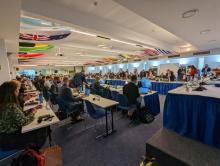Yesterday saw the close of the Forty-first Meeting of the Commission for the Conservation of Antarctic Marine Living Resources (CCAMLR).
The Commission met from 24 October to 4 November 2022. The meeting was attended by CCAMLR Members and Observers. The Commission meeting was chaired by Dr Jakob Granit (Sweden).
Many important issues were discussed. Of particular note:
- The Commission welcomed the Republic of Ecuador which became a Member of the Commission in October 2022.
- Mr Vitalii Tsymbaliuk (Ukraine) will Chair the Commission from the end of this meeting, when Sweden’s term expires, and for the next 2 years.
- Recognising that global climate change is one of the greatest challenges facing Antarctica and the ocean surrounding it, the Commission agreed a new Resolution on climate change which stresses the importance of taking urgent action in the Convention Area. All CCAMLR scientific working groups are required to include consideration of the impact of climate and environmental change in their advice.
- The Commission received three proposals for the development of new marine protected areas (MPAs). It agreed to hold a Special Meeting of the Commission in order to progress MPA implementation, to be hosted by Chile in the first half of 2023.
- The Commission discussed a workplan to progress a holistic approach to management around the Antarctic Peninsula, taking into consideration potential new catch limits, the proposal for an MPA in the region, and new scientific monitoring, data collection and management approaches for the krill fishery in the area. The Commission extended the current subarea limits on the krill fishery catch (Conservation Measure 51-07) for another year while this work progressed.
- The impact of fishing in the waters surrounding Antarctica on marine mammals and seabirds continues to be reduced. This year, a record low 15 birds were killed in longline fisheries and 4 in trawl fisheries for krill. The number of marine mammals killed is small and new data collection protocols have been agreed to better understand causal factors and mitigation.
- The Scientific Committee has developed the scientific basis for a revised approach to managing the krill fishery which takes account of the distribution and abundance of krill and the requirements of predators and the ecosystem.
- The Commission’s compliance assessment once again indicated an overall very high and increasing level of compliance by Contracting Parties with conservation measures. The Commission improved several conservation measures which will increase the ability of CCAMLR to monitor compliance and combat IUU fishing.
- The Commission approved a new 4-year Strategic Plan and the Scientific Committee agreed strategic priorities for its work over 2023–2027.
What is CCAMLR?
- The Commission for the Conservation of Antarctic Marine Living Resources.
- Established by an international treaty in 1982.
- Its objective is the conservation of Antarctic marine life while providing for rational use.
- 27 Members and a further 10 countries have signed the Convention.
- CCAMLR is a key international instrument which is part of the Antarctic Treaty System that, on the whole, has ensured peace, freedom of science and protection of the environment in the Antarctic region for 60 years. In addition to CCAMLR, the system comprises the Antarctic Treaty and its Environmental Protocol, the Agreement on the Conservation of Albatrosses and Petrels, and the Convention on the Conservation of Antarctic Seals.
- The Secretariat (international Headquarters) is at 181 Macquarie Street, Hobart, Australia.
- Further information is available on the CCAMLR website, brochure or through our blog looking through the achievements of CCAMLR over the past 40 years.


